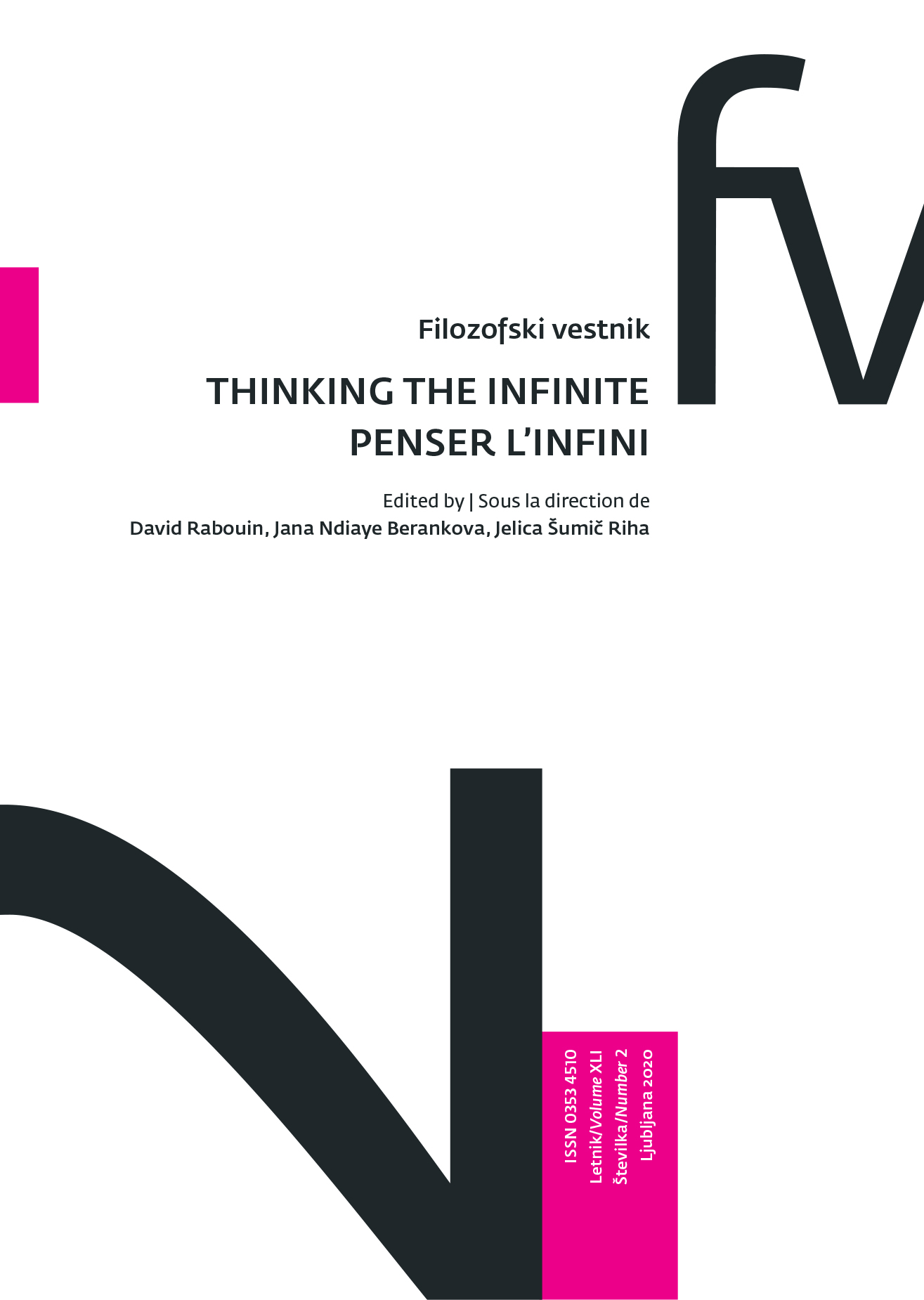Onstran pripoznanja: Badioujeva matematika telesne inkorporacije
DOI:
https://doi.org/10.3986/fv.41.2.11Ključne besede:
ontologija, objektivna fenomenologija, telo resnice, teorija kategorij, teorija toposovPovzetek
V Biti in dogodku Badiou razveže neskončno, Eno ter absolut, s čimer ustvari podlago za razdelavo nove teorije generičnega subjekta, čigar eksistenco je mogoče dokazati s pomočjo teorije množic. V Logikah svetov pa se Badiou ukvarja z načini, kako se ta subjekt pojavlja v svetu, in sicer prek inkorporacije v subjektivizabilno telo, telo resnice. V nasprotju z Bitjo in dogodkom dokazovanje tega argumenta poteka na dveh ločenih ravneh, na ravni »kalkulirane fenomenologije« in na ravni formalizma, za katerega teorija kategorij ponuja splošno logiko, povezava obeh ravni pa omogoči zaris »onto-logike«. V pričujočem besedilu sledimo Badioujevi izpeljavi pojma telesa resnice in osvetlimo uporabljeno inovativno fenomenološko metodologijo, s pomočjo katere je pojasnjena vez med telesom resnice in svetom.
Prenosi
Literatura
Badiou, Alain, Being and Event, trans. Oliver Feltham, Continuum Books, London and
New York 2005
— Briefings on Existence. A Short Treatise on Transitory Ontology, trans. ed. Norman Madaras,
State University of New York Press, Albany, NY 2006
— Conditions, trans. Steven Corcoran, Continuum, London 2009- Le Concept de Modèle.
Introduction à une Épistémologie Matérialiste des Mathématiques, Fayard, Paris 1969
— Court traité d’ontologie transitoire, Seuil, Paris 1998
— Deleuze, “la clamour de l’Être”, Hachettes, Paris 1997
— Entretien avec Peter Engelman, Quel communisme?, Bayard, Paris 2015
— Ethics. An Essay on the Understanding of Evil, trans. and intro. Peter Hallward, Verso,
New York 2001
— La Tétralogie d’Ahmed, Actes Sud, Arles 2010
— L’Être et l’événement, Seuil, Paris 1988
— L’Éthique. Essai sur la conscience du mal, Hatier, Paris 1993
— L’Immanence des vérités. L’Être et l’événement 3, Fayard/Ouvertures, Paris 2018
— Le Nombre et les nombres, Gallimard, Paris 1990
— Logiques des mondes. L’Être et l’événement 2, Éditions du Seuil, Paris 2006
— Manifeste pour la philosophie, Paris, Seuil 1989
— Manifesto for philosophy, followed by two essays, ed. and trans. Norman Madarasz,
State University of New Press, Albany, NY 1999
— “Mathematics and philosophy”, in Virtual Mathematics, ed. Simon Duffy, pp. 12-30,
Clinamen Press, New York 2006
— Mathematics of the Transcendental, trans. and ed. A.J. Bartlett and Alex Ling. Bloomsbury
Press, London 2014
— Para uma nova teoria do sujeito, Editora Relume Dumará, São Paulo 1994
— Second Manifeste pour la philosophie, Fayard/Ouvertures, Paris 2009
— Théorie du Sujet, Paris, Seuil 1982
Badiou, Alain and F. Tarby, Philosophy and the Event, trans. L. Burchill, Polity Press,
Cambridge, UK 2013
Badiou Alain and Gilles Haéri, Éloge des mathématiques, Flammarion, Paris 2015
Balibar, Étienne, “Le Structuralisme : une Destitution du sujet?”, Revue de métaphysique
et de morale 45 (1/2005), pp. 5–22.
Burhanuddin, Baki, Badiou’s Being and Event and the Mathematics of Set Theory, Bloomsbury,
London 2015
Barwise, Jon and Lawrence Moss, Vicious Circles: on the Mathematics of Non-Wellfounded
Phenomena, CSLI, Stanford, CA 1996
Cantor, Georg, “Foundations of a General Theory of Manifolds: A Mathematico-Philosophical
Investigation into the Theory of the Infinite” [1883], trans. William Ewald, in
From Kant to Hilbert: A Source Book in the Foundations of Mathematics, Volume II.,
ed. Ewald, Oxford University Press, Oxford 1996
— Contributions to the Founding of the Theory of Transfinite Numbers, trans. Philip Jourdain,
Dover, London 1915
Carmello, Olivia, Theories, Sites, Toposes. Relating and Studying Mathematical Theories
through Topos-Theoretic Bridges, Oxford University Press, Oxford 2018
Cohen, P. J., “The Independence of the Continuum Hypothesis”, Proceedings of the National
Academy of Sciences of the United States of America 50 (6/1963), pp. 1143–1148
— Proceedings of the National Academy of Sciences of the United States of America 51
(1/1964), pp. 105–110.
Constantinou Marios and Norman Madarasz, “Being and Spatialization: an interview
with Alain Badiou”, Environment and Planning D: Society and Space 27 (2009), pp.
–795
Desanti, Jean-Toussaint, “Quelques remarques à propos de l’ontologie intrinsèque
d’Alain Badiou”, Les Temps Modernes (526/1990), pp. 61–71
Fraser, Zachary, “The Law of the Subject: Alain Badiou, Luitzen Brouwer and the Kripkean
Analyses of Forcing and the Heyting Calculus”, The Journal of Natural and Social
Philosophy 2 (1-2/2006), pp. 94–133
Gödel, Kurt, “What is Cantor’s Continuum Problem?”, in Kurt Gödel: Collected Works,
vol II., ed. Solomon Feferman, et. al., pp. 1938–1974, Oxford University Press, New
York 1995
— “The Consistency of the Axiom of Choice and the Generalized Continuum Hypothesis”,
Proceedings of the national academy of sciences of the U.S.A. 24 (1938), pp.
–557
Grattan-Guinness, I., The Search for Mathematical Roots. (1870–1940): Logic, Set Theories
and Foundations of Mathematics from Cantor through Russell to Gödel, Princeton University
Press, Princeton, NJ 2000
Grothendieck, Alexandre, Récoltes et Semailles, Université des Sciences et Techniques du
Languedoc, Montpellier 1985–1987
Hallward, Peter and Knox Peden (eds.), Concept and Form, Verso, New York 2012
Heidegger, Martin, Being and Time, trans. John Macquarrie and Edward Robinson, Harper
and Row, New York 1962
Heller, Michael and W. Hugh Woodin, Infinity: New Research Frontiers, Cambridge University
Press, New York 2011
Hunter, Ian, “Heideggerian Mathematics: Badiou’s Being and Event as Spiritual Pedagogy”,
Representations 134 (Spring 2016), pp. 116–156
Jech, T., Set Theory, Springer-Verlag, Berlin 2003
Lacan, Jacques, Séminaire livre XX: Encore (1972–1973), ed. Jacques-Alain Miller, Editions
du Seuil, Paris 1999
— Autres écrits, Seuil, Paris 2001
Prenosi
Objavljeno
Kako citirati
Številka
Rubrike
Licenca
Avtorji jamčijo, da je delo njihova avtorska stvaritev, da v njem niso kršene avtorske pravice tretjih oseb ali kake druge pravice. V primeru zahtevkov tretjih oseb se avtorji zavezujejo, da bodo varovali interese založnika ter da bodo povrnili morebitno škodo.
Podrobneje v rubriki: Prispevki





